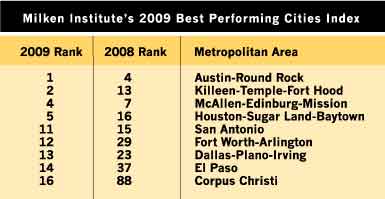Texas is Big on Economic Growth - and Has the Numbers to Prove It
Apr/May 10

According to the Texas Workforce Commission, Texas has also created more private-sector jobs than any other state over the last decade.
Then there is Texas' robust economic performance - as the eleventh-largest economy in the world, Texas generated a gross state product (GSP) for fiscal year 2009 of approximately $1.25 trillion and continues to diversify aggressively into high-growth, knowledge-based industries. Texas has also led the nation in export revenue for the last eight years (2002-2009), shipping a total of $163 billion in products in 2009 alone.
With this kind of economic performance, it's no wonder people and businesses are flocking to this land of opportunity. Texas gained more people (478,000) than any other state between July 2008 and July 2009. And, according to the U.S. Census, six Texas counties are among the 25-fastest growing counties in the United States.
"Texas, so far, is the big winner," says William Frey, demographer at the Brookings Institution. "Big Texas metros are doing well because they avoided a lot of the pitfalls of the housing boom and bust."
Austin, Dallas, San Antonio, and Houston are all high-growth cities with expanding energy, technology, government, and education sectors. Like Austin and Dallas, Houston is expected to experience a three-year, 7 percent rise in jobs. The hottest projected job growth, however, is in San Antonio, where four military bases and several big development projects should support an 8.32 percent increase in jobs.
Quick Recovery
A well founded, diversified economy - underpinned by low taxes, a reasonable regulatory framework, targeted government incentives and funding, and a skilled and educated work force - helped sustain the Texan economy through the recession.
Texan exports totaled more than $163 billion in 2009, led by computers and electronics, chemicals, machinery, petroleum and coal, and transportation equipment. Texas' largest export markets continue to be its NAFTA trading partners: Mexico purchased $56 billion in Texas-manufactured goods and Canada $13.7 billion. China ($8.9 billion), the Netherlands ($6 billion), and Korea ($5.3 billion) rounded out the top-five export destinations.
Texas has the geographic location and transportation infrastructure to support its top-ranked export economy. International border crossings between Texas and Mexico (Brownsville, McAllen, Laredo, El Paso) are among the busiest in the nation. Modern air, rail, highway, and water transportation infrastructure provides timely access to national and international markets. Texas boasts 13 deepwater ports with channels at least 30 feet deep along the Gulf Coast, including the Port of Houston, which ranks second in the nation and 15th in the world for cargo volume.
Open for Business
Committed to creating good-paying jobs and new business opportunities, Texas provides one of the lowest tax burdens in the United States, including no personal income tax. The state also has no state tax on equipment used for pollution control, machinery/equipment utilized in manufacturing, and goods in transit.
The 80th Texas legislative session recently passed several bills designed to enhance economic development, including an additional $200 million for the Texas Enterprise Fund (TEF) and $203 million for the Texas Emerging Technology Fund (TETF).
The Texas Enterprise Fund - the largest "deal-closing" fund of its kind in the nation - provides critical funding for selected economic development projects, including infrastructure and community development, job training programs, and business incentives. Projects must be unanimously approved by the governor, lieutenant governor, and speaker before TEF funds can be awarded. About $1.1 million in TEF funds were recently used to close a deal with Allstate Insurance Company, which plans to open an $11.6 million, bilingual customer information center in San Antonio. The nation's second-largest insurance company, Allstate will hire 600 employees to operate the state-of-the-art center.
The Texas Emerging Technology Fund was originally a $200 million initiative passed by the Texas legislature in 2005 to support high-tech start-up companies. The fund was reauthorized in 2007 and again in 2009 ($203 million infusion) for the 2010-2011 biennium. Over its short history, the TETF has allocated more than $128 million for nearly 100 early-stage companies and $153 million in grant-matching and research and development funds to Texas universities.